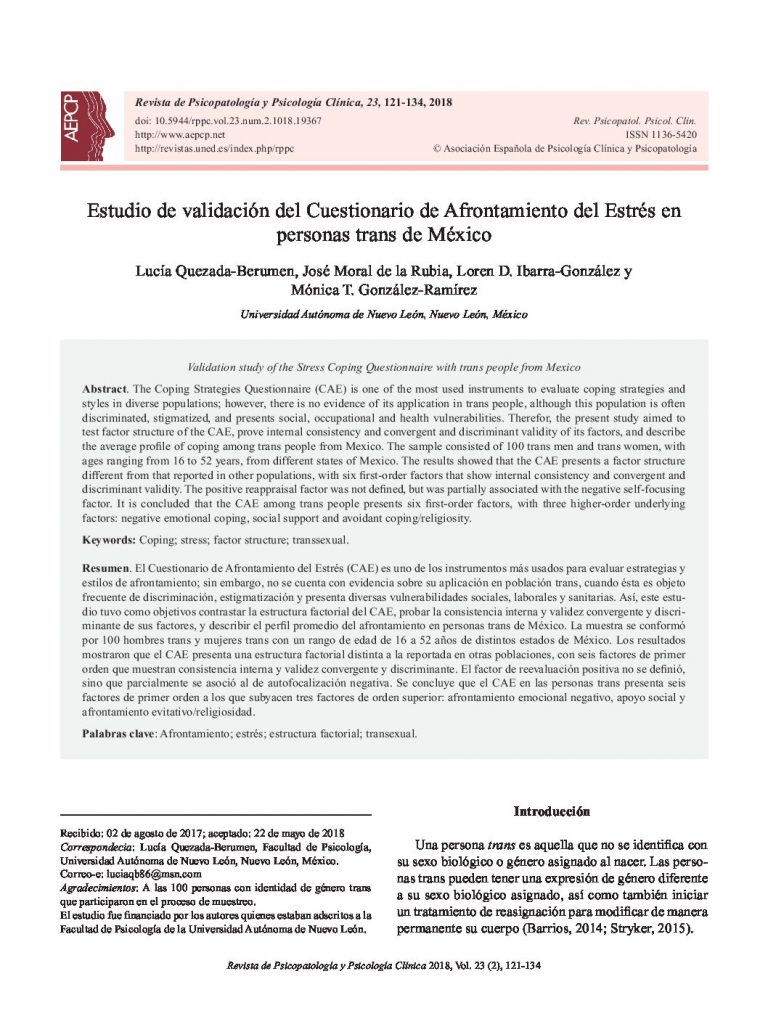Estudio de validación del Cuestionario de Afrontamiento del Estrés en personas trans de México.
Estudio de validación del Cuestionario de Afrontamiento del Estrés en personas trans de México.

- Reconocimiento de expresión facial emocional en el trastorno de déficit de atención e hiperactividad en la infancia.
- Calidad de vida en personas diagnosticadas con trastorno de personalidad límite: Papel mediador de la satisfacción vital.
- Exploring the screening capacity of the European Portuguese version of the 15-item Geriatric Depression Scale.
- Invarianza factorial y temporal de una versión española del Cuestionario de Regulación Emocional ERQ.
- Estudio de validación del Cuestionario de Afrontamiento del Estrés en personas trans de México.
- El carácter transdiagnóstico de las intrusiones mentales: Una revisión y una propuesta basada en datos.
- Impacto de la autopresentación perfeccionista en la salud infantil y adolescente: Una revisión sistemática.
The Coping Strategies Questionnaire (CAE) is one of the most used instruments to evaluate coping strategies and styles in diverse populations; however, there is no evidence of its application in trans people, although this population is often discriminated, stigmatized, and presents social, occupational and health vulnerabilities. Therefor, the present study aimed totest factor structure of the CAE, prove internal consistency and convergent and discriminant validity of its factors, and describe the average profile of coping among trans people from Mexico. The sample consisted of 100 trans men and trans women, with ages ranging from 16 to 52 years, from different states of Mexico. The results showed that the CAE presents a factor structure different from that reported in other populations, withsix first-order factors that show internal consistency and convergent and discriminant validity. The positive reappraisal factor was not defined, but was combined with the negative self-focusing factor to define a pessimism factor. It is concluded that the CAE among trans people presents six first-order factors, with three higher-order underlying factors: negative emotional coping, social support and avoidantcoping/religiosity.
El Cuestionario de Afrontamiento del Estrés (CAE) es uno de los instrumentos más usados para evaluar estrategias y estilos de afrontamiento; sin embargo, no se cuenta con evidencia sobre su aplicación en población trans, cuando ésta es objeto frecuente de discriminación, estigmatización y presenta diversas vulnerabilidades sociales, laborales y sanitarias. Así, este estudio tuvo como objetivos contrastar la estructura factorial del CAE, probar la consistencia interna y validez convergente y discriminante de sus factores, y describir el perfil promedio del afrontamiento en personas trans de México. La muestra se conformó por 100 hombres trans y mujeres trans con un rango de edad de 16 a 52 años de distintos estados de México. Los resultados mostraron que el CAE presenta una estructura factorial distinta a la reportada en otras poblaciones, con seis factores de primer orden que muestran consistencia interna y validez convergente y discriminante. El factor de reevaluación positiva no se definió, sino que se juntó con el de autofocalización negativa para definir un factor de pesimismo. Se concluye que el CAE en las personas trans presenta seis factores de primer orden a los que subyacen tres factores de orden superior: afrontamiento emocional negativo, apoyo social y afrontamiento evitativo/religiosidad.



